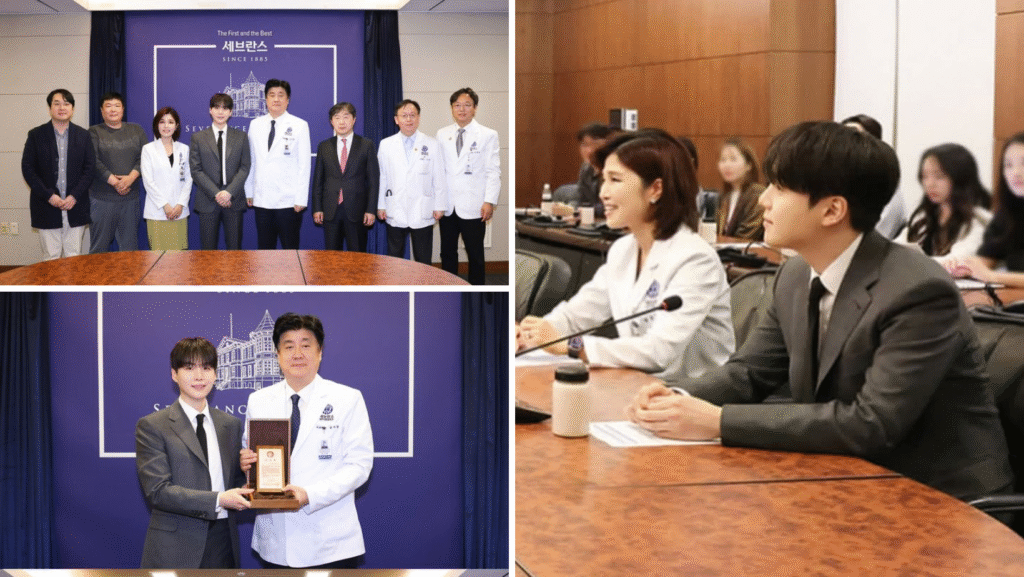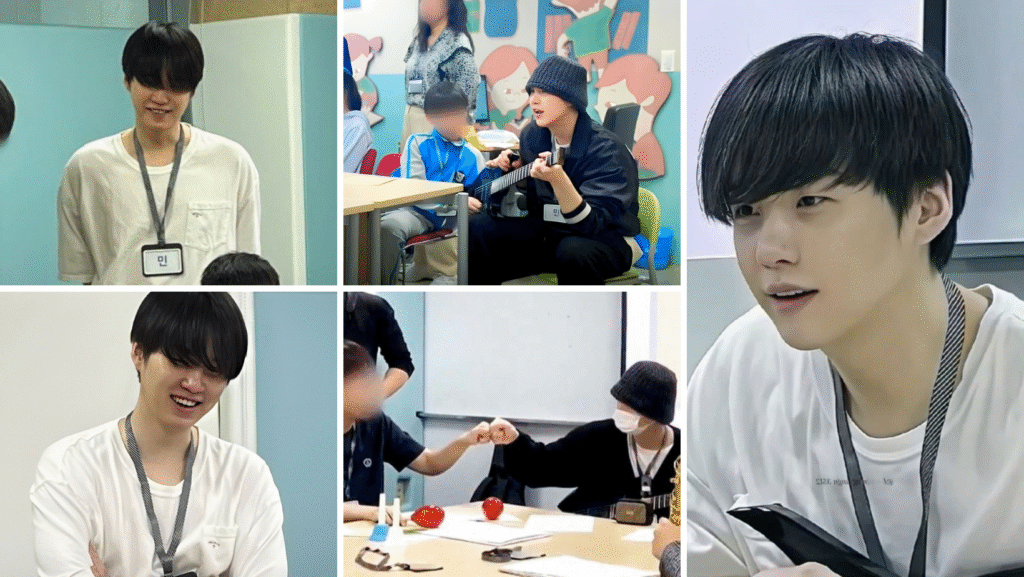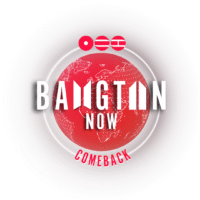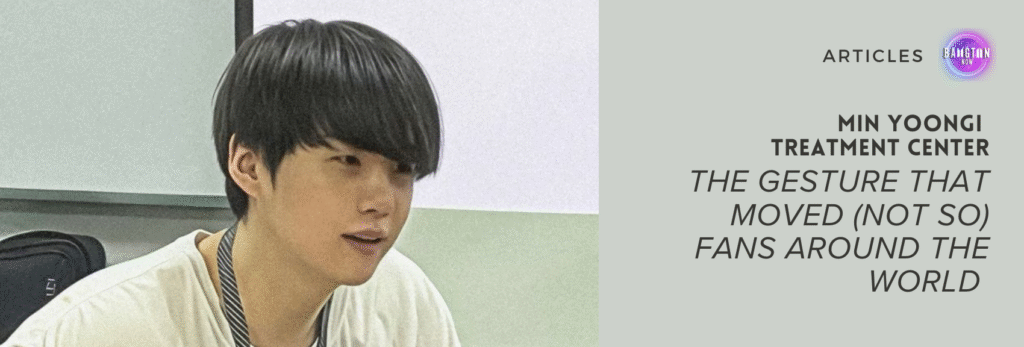Ever since news broke about SUGA’s donation toward the creation of the Min Yoongi Treatment Center, that silence during his military service started to sound different. It wasn’t just about staying low-key — it was a quiet kind of generosity, hidden in plain sight, done the way only he knows how.
Even though we know he’s a more reserved person, everyone was expecting an Instagram or Weverse post as soon as he completed his military service. But there was nothing. He had said we’d see him again in 2025 — and he kept that promise.
What we didn’t expect was to receive “another Yoongi” when he reappeared in June 2025…
If we already had BTS’s SUGA and Agust D, his solo alter ego, allow me to introduce you to Professor Min — music teacher for autistic children and teens, philanthropic millionaire donor to this cause, and now, founder of a Treatment Center. But wait — out of nowhere?
Well, not exactly out of nowhere. We just didn’t know. As always, Yoongi worked in silence — but accomplished so much.
When silence speaks through actions – Meet Professor Min
“The main reason I started studying psychology was so it could contribute to my music. Understanding emotions from a theoretical perspective is a very powerful tool. I have two dreams: one is to grow old, with white hair, still on stage, singing and playing the guitar. The other is to become a psychologist. Because I want to help those who come after me and do similar work. I did some research and saw that it takes time, so it’s not something I should start just yet, but I would really like to become a psychologist one day. And since I have these dreams, I don’t think I’ll just sit back and rest on my laurels in the future.”
(Min Yoongi)
Yoongi said this in an interview for the book Beyond the Story, the official BTS biography, way back in 2023. We don’t know exactly when the idea of doing something beyond music was born, but the seed of wanting to help people was already there.
The Min Yoongi Treatment Center was created many years after that interview – a clear reflection that his dreams went far beyond the stage.
Min Yoongi Treatment Center: what we know
Even people outside the fandom were moved by the news of SUGA’s donation. He contributed a multi-million amount to create a Treatment Center aimed at supporting the care and social inclusion of autistic children and teenagers, in partnership with Severance Children’s Hospital in South Korea.
The donation amounts to around 5 billion South Korean won – approximately 3.6 million dollars. It was the largest sum ever donated within the entire Yonsei University Medical System, to which Severance is affiliated.

What touched fans – and even those who had no idea who that Korean musician was – wasn’t just the impressive amount of money involved. It was the fact that he spent months working on the project, personally engaging with the children. Just days after the news broke, photos were released showing Yoongi playing music for the kids – a gesture of love, giving something far more meaningful than money: time, heart, and soul.
Many artists donate money. Some even do it for tax breaks. But few – very few – are generous enough to give themselves completely. Maybe that’s why the creation of the Min Yoongi Treatment Center feels so powerful, and why it resonated so deeply, even beyond the fandom.
Project MIND – Music as treatment for body, mind, and soul
More than just a financial donation, the Min Yoongi Treatment Center was born from Yoongi’s active involvement in the creation of MIND (Music Innovation and Development) – a project that brings together art, science, and care to support children with autism.
- Music (stimulating sensory and emotional experiences)
- Interaction (practicing communication and social bonding)
- Network (developing group relationships)
- Diversity (embracing differences and promoting inclusion)
The project was designed to bring together health professionals, therapists, and artists in a space where music is a tool for healing and growth. Yoongi worked side by side with specialists to create the MIND program, including renowned professor Chun Keun-ah, a leading expert in child psychiatry from Yonsei University’s College of Medicine.
For months, he collaborated closely with the professor to understand the children’s needs and took an active role in developing the MIND program.
SUGA played instruments for the children, interacted with them, and encouraged emotional expression through rhythm and harmony. But he didn’t stop there – he taught the children how to play the instruments. Professor Min in action!

Over time, a beautiful change was observed: the children began expressing themselves more – both verbally and socially. And more than that – their emotions came to the surface. Music is, without a doubt, medicine for the soul.
Min Yoongi Treatment Center
As recognition for his direct involvement, the new center created through the project was named the “Min Yoongi Autism Center”. Located in Seoul, the space will be dedicated to children and families seeking a more human-centered and effective approach to treating ASD (Autism Spectrum Disorder) and other developmental conditions.
The Min Yoongi Treatment Center immortalizes Yoongi’s name and symbolizes the lasting impact of his transformative gesture.
The Center will also serve as a hub for research, clinical studies, academic publications, and the development of technical manuals to support and spread the scientific validation of the MIND Program globally, allowing its discoveries to be shared in other countries.
“Being part of the treatment process for these children with autism has filled me with deep gratitude and joy. I’ll continue contributing so that more children can become active members of our society,” said SUGA in an interview with Yonhap News.
Korean media highlighted the importance of the initiative, especially considering that estimates suggest there are currently around 300,000 people with developmental disabilities in Korea, approximately 40,000 of whom are autistic.
After the first reports were released shortly after Yoongi’s official discharge from military service, the world went wild, eager to learn more about a BTS member’s extraordinary involvement with such a meaningful cause. The keywords “SUGA BTS autism” surged in Google searches.
The Opening Ceremony of the Min Yoongi Treatment Center is already scheduled for September 30. The event will feature a special performance by Dream With Ensemble, Korea’s first clarinet group made up of musicians with developmental disabilities — a moving and symbolic way to celebrate this historic milestone.
Heartfelt Testimonials from Professor Min’s Students
To share more details about Yoongi’s involvement in the children’s daily lives, Severance Hospital released a touching documentary about the project, titled “The Story of the Min Yoongi Treatment Center.”
It wasn’t released with English subtitles, but we brought the main highlights to you on our Telegram and Instagram channels at the time of its launch in June.
But, here it is:
The documentary from Severance Hospital shows how music became a bridge between autistic children and teens and the world. The Min Yoongi Treatment Center was born from this very essence – but perhaps the greatest gift was the real, heartfelt connection Yoongi built with each one of them.
Some of the children’s words:
- “Professor Min! I listen to this song a lot when I go camping with my dad. Please play it for us first!”
- “Professor Min! I learned xylophone and ukulele in the MIND program and I want to play for more people. I think I can do it!”
- “Professor Min! I like the bells because they have a bright sound.”
With admiration, they also said:
- “He really teaches so well. He is the best teacher!”
Professor Chun Geun-ah commented:
“From the preparation to his participation in the program, I realized he truly wasn’t just a regular donor. Even on weekends, he was never late – on the contrary, he arrived before the staff, rehearsed with his guitar, and met with therapists before the sessions. He placed himself at the children’s eye level… Seeing that made me feel deep respect.”
At their first meeting, Yoongi had read almost the entire 500-page book by Professor Chun and asked such profound questions that it surprised her.
She also revealed:
“The children would choose different instruments and play together. In those moments, SUGA would say: ‘You start, I’ll follow.’ He adjusted himself to their rhythm.”
In some sessions, he simply stayed in the background, playing softly while they wrote or drew, speeding up or slowing down the music to let them feel the blend between image and sound.
Yoongi brought his own instruments, taught them how to play, how to write lyrics, and how to express emotions.
Parents were told that SUGA was participating as a “volunteer therapeutic assistant”, but the children didn’t know that their music teacher was a global idol. For them, he was simply Professor Min.
The documentary highlights an emotional statement from Yoongi that touched fans and people all over the world:
“I just hope you can be happy. Living is not something grand. It’s more about finding happiness in the little things and enjoying time with yourself. All of that together is what we call happiness. Try not to worry. I hope you can live like that.”
Min Yoongi Treatment Center: a Legacy of Life
Yoongi has always been very honest about his struggles with depression, social phobia, and anxiety, both in interviews and in his song lyrics. If you’d like to know more, keep an eye on the blog — soon we’ll publish an article about the Scar Trilogy, which explores part of his work and his life, since one is inseparable from the other.
So, it feels only natural that he became involved in the creation of the Min Yoongi Treatment Center as a kind of legacy. If music was the way he found to cope with his own struggles — the “treatment” for his pain — couldn’t it also serve as treatment for the pain of others?
There are hundreds, perhaps thousands, of scientific studies proving that music has a positive effect on the mind in cases of depression and anxiety, that it facilitates learning, and that it can be a powerful tool in various clinical settings – including Autism Spectrum Disorder (ASD), as Severance Hospital’s work has already been demonstrating.
What exactly is ASD? And why is music so important in this context?
ASD (Autism Spectrum Disorder) is a neurodevelopmental condition (not a mental illness, don’t confuse the two) marked by challenges in social communication, restrictive behavior patterns, and specific interests.
Yoongi donated to autistic children precisely because he understands the importance of therapeutic approaches that go beyond the conventional — such as music, which truly transforms lives.
Globally, 1 in every 100 people is autistic. And many families face difficulties due to late diagnosis and limited access to specialized healthcare services.
Art is widely used as an ally in treatment. It contributes to emotional growth, facilitates non-verbal expression, and improves social interactions, helping individuals move toward a more independent life.
Music, in particular, is one of the most transformative tools:
- Improves social skills
- Facilitates interaction
- Develops verbal and non-verbal communication
- Increases vocalizations and use of gestures
- Reduces anxiety and promotes emotional regulation through rhythm and melody
- Stimulates attention, memory, and cognitive skills
- Strengthens the bond between child and family in shared sessions
- Supports motor development and social engagement
Autistic children and teens exposed to music from an early age develop emotionally and learn to express feelings — even without relying on speech. This makes them more independent, expanding their inclusion in society.
For children and adolescents on the autism spectrum, music is a tool to live better.
The Psychopedagogical Impact of the Project: Why the Min Yoongi Treatment Center Goes Far Beyond Music
The Min Yoongi Treatment Center represents much more than generosity. What Yoongi did sheds light on a sensitive issue that is still rarely discussed: how we deal with the diagnosis, treatment, and inclusion of people on the autism spectrum, especially children. From a psychopedagogical perspective, initiatives like this have enormous transformative power because they give children real tools to grow, develop, and gain greater autonomy in their daily lives.
The Challenge of Diagnosis: When Autism Isn’t Obvious
One of the biggest obstacles families face is precisely the diagnosis of Autism Spectrum Disorder (ASD). Many times, it is delayed, incorrect, or causes great confusion. That’s because autism doesn’t manifest the same way in every person. Signs can be very subtle, especially in the first years of life, and often go unnoticed.
School as the Starting Point
In most cases, it’s within schools that the first signs begin to be noticed. Teachers, who spend every day with children, often realize when something is different: delayed speech, difficulty socializing, repetitive behaviors, and other indicators that a child may need a specialized evaluation. Many educators are trained to identify these clues and alert families.
That’s why it is essential for schools to be well-prepared, with ongoing training for their staff. When they can identify these signs early, they can refer the child for a specialized evaluation – and that makes all the difference in their development.
Early Diagnosis Changes Everything
When autism is diagnosed early and correctly, a child can quickly begin the therapies they need to develop properly. This may include speech therapy, psychology, occupational therapy, psychopedagogical support, and more.
These interventions make all the difference because they help the child reach their potential while respecting their pace and unique needs. The earlier it begins, the greater the chances of progress.
So, what does it mean to be on the autism spectrum?
When we talk about the “autism spectrum,” we mean that autism doesn’t look the same for everyone. There are different levels and ways it manifests – from children who face only a few socialization challenges to those with significant communication and behavioral difficulties.
Many people still believe that every autistic person fits into a single profile – and that is a big mistake. In reality, the spectrum is incredibly diverse, which highlights the importance of looking at each child individually, with care and attention.
Not every stereotypy is autism – and not every autistic person shows stereotypies
One common misconception is around stereotypies. These are repetitive behaviors, such as rocking, hand-flapping, or repeating sounds. While they are common among autistic individuals, it’s important to understand: not every stereotypy is a sign of autism, and not every autistic person exhibits them.
Another frequent mistake is assuming that difficulties in social interaction automatically mean autism. Many people, because they feel different or go through emotional struggles, end up believing they are autistic without ever undergoing a professional evaluation. It’s often a search to belong, to understand themselves. However, this can create unfair labels and a lot of confusion.
The diagnosis of ASD is complex, clinical, and multidisciplinary, and can only be confirmed by qualified professionals. No online list of symptoms can confirm such a diagnosis.
Not every autistic person is a genius — but every autistic person has something special
One of the most common misconceptions is believing that every autistic person is gifted or highly skilled in a specific area. This idea, besides being untrue, can create unrealistic expectations for families. And when those expectations aren’t met, it can lead to frustration and even suffering.
The truth is simple: every autistic individual is unique. Some display very clear talents early on; others have gifts that are more subtle, which only surface with time, patience, and the right encouragement. But all of them are incredible in their own way.
When they receive the correct diagnosis and the necessary psychopedagogical support, these children can develop their abilities and grow according to their own potential. This way, they can become increasingly independent and find their place in the world — in the special way that belongs only to them.
Autonomy and Inclusion: Families’ Greatest Challenge
One of the biggest fears among families of autistic individuals with higher levels of support needs is about the future: “Will my child be able to manage on their own? Will they be able to communicate? Have a social life? Be independent?”
This is where projects like MIND and the Min Yoongi Autism Center make all the difference. They don’t just provide treatment – they also nurture practical and emotional skills, such as communication, socialization, self-expression, and self-regulation. These are essential tools that allow children to grow and increase their chances of autonomy.
The Min Yoongi Treatment Center was born not only from a financial investment but also from Yoongi’s time, attention, and presence. This human care has a direct impact on children’s development and shows how small actions can generate great transformations.
Global Fan Reactions – Lael’s Story
Because of all the implications and discussions around autism, the “SUGA effect” — which began with the announcement of his involvement in the ASD cause — will continue to unfold, with the opening of the Min Yoongi Treatment Center in September 2025 and the global sharing of its methodology, using music as therapy for children.
The Min Yoongi Treatment Center has crossed Korea’s borders and touched the hearts of thousands of families, inspiring empathy, hope, and action.
The visibility SUGA brought to this cause is priceless. In a world where prejudice and misinformation about ASD are still so common, having a public figure like him speak about it is fundamental.
Instituto Singular, one of Brazil’s leading organizations dedicated to the care, education, and support of autistic children and adolescents, published several posts recognizing SUGA’s initiative. Some of their remarks included:
- “SUGA didn’t just donate money. He donated presence. Attention. Listening.”
- “While some think being ‘different’ is a problem to fix, he proves (with a guitar in hand) that being different is just another way of being amazing.”
Yoongi’s initiative deeply moved a mother and b-ARMY, who generously shared her exclusive testimony with our fanbase. We’ve translated her words below, originally published in Portuguese on our social media (but it’s worth checking the Instagram post for comments and other testimonials, using Instagram’s built-in translation tool). Look at one of them:
Andressa, mother of Lael, told us how Yoongi’s action touched her directly:
“I’m the mother of a 5-year-old boy, autistic, level 3 support, and non-verbal. He speaks very few words, doesn’t form sentences… but recently, he started saying Yoongi’s name. That, to me, says so much.
Our routine is intense, marked by meltdowns, sleepless nights, attempts of self-harm… but also by a lot of love, small victories, and hope. As a mother, I’m always studying, taking courses, learning, because I know progress also depends on me. Therapists are incredible, but reinforcement at home is indispensable.
When I came across the news that Yoongi had donated to a support center for autistic children, I cried. I cried because my son, who sometimes calls him ‘dad’ (even though I never taught him that), finds in BTS — especially in SOPE — a piece of comfort and connection with the world.
Yoongi, if this ever reaches you: thank you, my love. For seeing these children. For caring. For turning love into action. You remind me every day that I made the right choice in loving you.”
Here it is:
BTS’s Involvement in Social Causes and the Inspiration for ARMY to Act
Yoongi’s donation to the ASD cause was not an isolated case. Before this, he had already donated 200 million won (approximately 800,000 reais) to children with cancer and 100 million won (around 400,000 reais) during the COVID-19 pandemic. His donations have especially focused on medical care and treatment.
The Min Yoongi Treatment Center was created with the same sensitivity with which Yoongi has always approached the world – using his visibility to transform lives in a quiet, yet deeply impactful way.
Beyond that, BTS fans know the group is constantly engaged in social action. All members, together or individually, support important causes, whether through donations or literally rolling up their sleeves – often without even publicizing it.
Yoongi’s initiative also strongly resonated within ARMY, which has a long history of global mobilization for social causes.
If you’d like to get involved in the cause supported by Yoongi, the good news is that it’s already possible to make direct donations to the Min Yoongi Autism Center through Severance Hospital’s official website (via PayPal for international donations).
A few days after the donations opened, about 300 million won (approximately 1.17 million reais) had already been raised: Severance Hospital Official Donation Page.
For now, the Min Yoongi Autism Center will primarily serve Korean children and adolescents, but its focus is on developing research and therapeutic methodologies that will be shared freely with professionals and institutions around the world.
If you feel inspired by this story, take a cue from Indian ARMY, who created the project Yoongi’s Healing Notes: a music therapy initiative for autistic children at the Action For Autism (AFA) center in New Delhi. A powerful demonstration of love in action, perfectly aligned with the spirit of what SUGA started.
Around the world, there are countless serious institutions you can support. Beyond donations, volunteer work makes a huge difference too. Whether with time, resources, or knowledge, every gesture counts. And as Yoongi himself has shown, you don’t need to make noise to make an impact.
Min Yoongi Treatment Center and Inspiration for the World – A Legacy That Keeps Growing
From Daegu to the world, he continues to reinvent himself. Born Min Yoongi, he became SUGA of BTS, then the fiery Agust D, and now the gentle Professor Min. What comes next, no one can predict.
Perhaps, in the future, older, he’ll truly become that white-haired man playing guitar and singing, just as he envisioned in Beyond the Story.
Probably, surrounded by children.
And you? What did you think of this inspiring initiative? Share it with your friends and spread this chain of kindness!
Written by Maga de Moraes and Denise Baptista.

